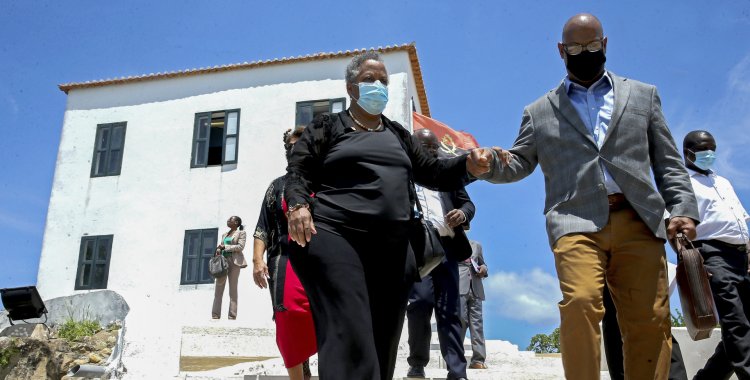It is a "painful" and emotional visit that Wanda Tucker, accompanied by her brother, Vincent Tucker, and her cousin, Carolita Cope, told Lusa as she left the Slavery Museum, in Luanda.
A moment that awakens memories that she has not lived, but that she feels through the stories that were transmitted to her as a family, and which, through academic research, brought her these days to Angola, to walk in the footsteps of her ancestors, the first Angolan slaves to reach the territory of the United States of America (USA), in Virginia, then a British colony, 400 years ago.
The Tuckers will be descendants of Antoney, or António, who arrived in the current territory of the US state of Virginia in August 1619, aboard a Portuguese ship with 20 other slaves from Angola, to work on Captain William Tucker's plantation, in Point Comfort, now Fort Monroe.
Wanda's emotion when speaking after her visit to this emblematic place, installed in the Casa Grande Chapel, permeates through the pauses, a few interrupted sentences and moist eyes.
It was in this 17th century temple that slaves were baptized before boarding the slave ships that crossed the Atlantic Ocean towards America.
And despite this being the second time he has been here, it is still "very painful, very hard", to feel the experience of those who have passed through here, which allows him to better understand the trajectories of slavery before reaching the coast of Virginia where he resides and the paper of religion in the brutality of this trade done in the name of profit.
This is one of the first stages of the family's journey, which arrived in Luanda on Monday, at the invitation of the President of the Republic, João Lourenço, and will continue this Wednesday to the province of Malanje, where they will visit some of the most important historical sites and tourist in the region.
It was the historian and genealogist Thelma Williams, who, through the stories of her grandmother, who had also heard them from her grandmother, shared the stories with the family: "We are descendants of the first black African child – at that time we did not know Angola – born in the British colonies, we are descendants of William Tucker. His parents, Isabel and Antoney were taken there in 1619", Wanda Tucker told Lusa.
More recently, through research by historians and academics, the Tucker family discovered that their ancestors were from Angola.
"For this reason, this visit to Angola gives us a broader perspective on the origins of that slave trade that brought our ancestors to Virginia in 1619", underlined the Afro-descendant North American.
After a first visit in 2019, Wanda Tucker has now returned to Angola, accompanied by her family, to continue building a relationship with the country, "in spirit and in knowledge", hoping to learn more, not only about the slave trade, but about the immaterial heritage of this legacy.
"The talents, the knowledge, the gifts that our ancestors transmitted to us and that have not been lost and that continue to be passed on over the years: their courage, their strength, their resilience, their faith", are the major objectives of this quest.
Wanda Tucker highlighted "the power" of those who survived on those ships, which is linked to the construction of African-American identity.
"There were two of the thousands of survivors. Thousands died, but our ancestors survived and had children and their children had children, in difficult times. That's why we're here, because of them", he says.
"Many African Americans identify themselves as African Americans, but they don't know the country of origin of their ancestors, so they can't make that call. Our family made that call and we can even say that we are Angolan Americans," she added.
For Wanda Tucker, this "dual link" also allows for a double historical perspective, involving two cultures and a broader narrative.
"We are building bridges to develop, on both continents, more knowledge, education and understanding, a more balanced narrative, a truth that has not yet been told", defended the representative of the Tucker family.
Wanda Tucker is committed to showing the best of Angola and believes that it is with small things that you should start.
"Education takes time, it doesn't change easily, political systems don't change easily, but when we manage to change people's hearts, then people become more interested, they want to invest, they want to come to Angola. We want to help people understand that their connection to Angolans, their descent is not something to be ashamed of, but a reason to be proud", underlined the African descendant, who wants her family to be a symbol of "that strength, that love, that resilience".
From the life of his ancestor, William Tucker, the first documented African descendant born in one of the 13 British colonies that gave rise to the United States, little is known, other than the date of birth – 1624 – and who was baptized with the same name as the captain for whom his parents, released in 1635, worked.
But his memory will last through his descendants and his place in history as the first child of African origin to be born on American soil.







